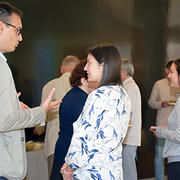
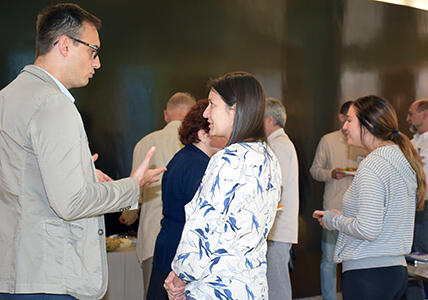 On Monday, June 25, 2018, students took their first classes of the 48th annual Harvard Ukrainian Summer Institute. At the opening reception later that day, our students had a chance to meet one another and get to know the faculty and staff of HUSI and the Ukrainian Research Institute.
On Monday, June 25, 2018, students took their first classes of the 48th annual Harvard Ukrainian Summer Institute. At the opening reception later that day, our students had a chance to meet one another and get to know the faculty and staff of HUSI and the Ukrainian Research Institute.
This year, we’re thrilled to welcome 14 talented students to Harvard for an intensive summer session. Five of these students are expanding their language skills in Professor Volodymyr Dibrova’s “Ukrainian for Reading Knowledge” class. Alexandra Bernosky, James Browning, Ozlem Eren, and Greg Martin are graduate students planning to add Ukrainian to their list of languages, while Meghann Pytka is an academic professional eager to carry out research in Ukrainian archives.
In the two subject courses (“Revolutionary Ukraine: Avant-garde Literature and Film from 1917 to the Euromaidan of 2014” with Professor George G. Grabowicz and “Laboratory of Modernity: Politics, Culture, and Society in Ukraine, 1800-Present” with Professor Serhiy Bilenky), nine students hail from three continents, including a very ambitious high school student from China who already has a great passion for Ukraine. Undergraduate, graduate, and professional students round out this diverse group. The class comprises: Taras Boyko, Jinning Jia, Hanna Protasova, Sophie Rathke, India Roberts, Sandra Joy Russell, Kirsten Tarves, Anton Varga, and Nicholas Zura.
One of HUSI’s best attributes is its ability to bring together a skilled group of individuals with many interests, backgrounds, and ambitions. This year certainly lives up to that expectation, promising to foster insightful conversations and lifelong ties. We invite the entire Harvard community and the wider public to join in this experience by attending our public HUSI lectures, which are listed on our Events Calendar. Check HURI’s website for updates and additions to this schedule.
Taras Boyko
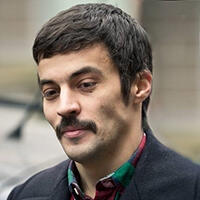 Taras Boyko joins us from Ukraine to take HUSI’s courses on Ukrainian literature and politics. He’s currently working on his PhD in Semiotics and Culture studies at the University of Tartu in Estonia, having previously completed his BA and MA in History both in Ukraine and abroad.
Taras Boyko joins us from Ukraine to take HUSI’s courses on Ukrainian literature and politics. He’s currently working on his PhD in Semiotics and Culture studies at the University of Tartu in Estonia, having previously completed his BA and MA in History both in Ukraine and abroad.
Clearly a traveller, he’s had his eye on HURI and the summer program for quite some time. During his freshman year in Kyiv, he learned about the Institute and discovered some of HURI publications, noticing that they were different from the academic works published in Ukraine in the 90s and early 2000s. “Years later, after I heard a lot about the Ukrainian Summer Institute from friends who were HUSI alumni, I had this feeling that HURI per se and HUSI in particular are the type of place where some sort of academic magic happens,” he said. “And that’s why I’m here: to combine thought-provoking classroom coursework with renowned scholars along with a chance to conduct my own Ucrainica-related research in the Harvard library and archives.”
Taras is interested in a variety of topics, but considers his biggest scholarly passion of the moment to be “various historiographic strategies as well as the (mis)use of history in public politics and media, mainly in the Ukrainian context, but also in the entire Central and Eastern Europe region.”
James Browning
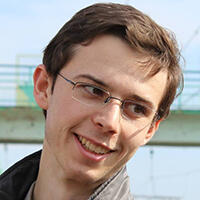 James Browning is currently a Master’s student in the REECA program at Harvard. He’s using the summer term to learn Ukrainian, for both research and more “indulgent” purposes: “I’m looking forward to the Reading course as a means to enhance my knowledge of the region through the lens of language and as a way to indulge a more selfish love of cultures, communication, sounds, and poetry,” he explained.
James Browning is currently a Master’s student in the REECA program at Harvard. He’s using the summer term to learn Ukrainian, for both research and more “indulgent” purposes: “I’m looking forward to the Reading course as a means to enhance my knowledge of the region through the lens of language and as a way to indulge a more selfish love of cultures, communication, sounds, and poetry,” he explained.
He also aims to expand his research prospects, with interests currently oriented on the “impact of the February Revolution on the understanding of the Russian nation in the imperial core.” Eventually, he hopes to teach.
Meghann Pytka
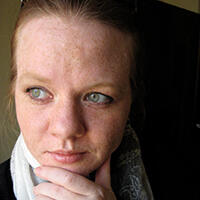 Dr. Meghann Pytka is the Assistant Director for the program in Women, Gender, and Sexuality Studies at Southern Illinois University, Carbondale, where she is also a lecturer in the Department of History. Since 2008, she has been faculty at Northwestern University in the graduate program in Public Policy and Administration. Additionally, she is the Resource Guides Digital Compiler for the Association for Women in Slavic Studies (AWSS). A scholar of nineteenth- and twentieth-century Central and Eastern Europe, her work focuses on topics of genocide and ethnic cleansing, imperialism, anti-colonial resistance, gender inequality, and nationalism. Pytka earned her PhD in History at Northwestern.
Dr. Meghann Pytka is the Assistant Director for the program in Women, Gender, and Sexuality Studies at Southern Illinois University, Carbondale, where she is also a lecturer in the Department of History. Since 2008, she has been faculty at Northwestern University in the graduate program in Public Policy and Administration. Additionally, she is the Resource Guides Digital Compiler for the Association for Women in Slavic Studies (AWSS). A scholar of nineteenth- and twentieth-century Central and Eastern Europe, her work focuses on topics of genocide and ethnic cleansing, imperialism, anti-colonial resistance, gender inequality, and nationalism. Pytka earned her PhD in History at Northwestern.
“I am eager to learn Ukrainian because I am tired of stumbling around Lviv using Polish,” she said. “Also, I want to conduct research in the regional archives.”
India Roberts
 Joining us from Ontario, Canada, where she’s working on her Master’s in Globalization and International development at the University of Ottawa, India Roberts looks forward to learning more about Ukrainian culture and society.
Joining us from Ontario, Canada, where she’s working on her Master’s in Globalization and International development at the University of Ottawa, India Roberts looks forward to learning more about Ukrainian culture and society.
For her BA Honours in Sociology, she wrote extensively on the Holodomor and the Euromaidan, tying this research back to her own Ukrainian heritage. As such, she’s planning to build on that knowledge and to take advantage of the HUSI community outside of class to practice her Ukrainian.
Regarding her future goals, she said, “I hope to apply this valuable knowledge to a career fostering diplomatic relations between Canada and Eastern Europe.” She currently works in emergency management operations for Public Safety Canada, which is equivalent to the DHS in the United States.
Sandra Joy Russell
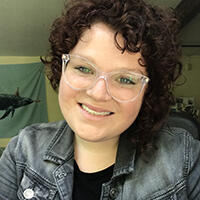 A PhD Candidate in Comparative Literature at the University of Massachusetts Amherst, Sandra Joy Russell holds an MA in English, and from 2012-2014, she served as a Peace Corps Volunteer in Lutsk, Ukraine. Her doctoral research explores Ukrainian and diasporic representations of the Euromaidan Revolution and the war in Donbas, particularly the role of non-fiction (including documentary and visual art) as forms of public and transnational engagement with post-Soviet Ukraine.
A PhD Candidate in Comparative Literature at the University of Massachusetts Amherst, Sandra Joy Russell holds an MA in English, and from 2012-2014, she served as a Peace Corps Volunteer in Lutsk, Ukraine. Her doctoral research explores Ukrainian and diasporic representations of the Euromaidan Revolution and the war in Donbas, particularly the role of non-fiction (including documentary and visual art) as forms of public and transnational engagement with post-Soviet Ukraine.
“Participating in HUSI this summer is a dream come true,” she said. “I am looking forward to thinking and learning alongside such amazing scholars in Ukrainian studies: an experience that I know will deepen my own knowledge and inspire me as I begin working on my dissertation this fall.”
Özlem Eren
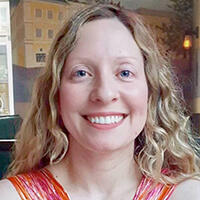 Özlem Eren is a first-year PhD Student in Art History at the University of Wisconsin-Madison, studying medieval art history. Her research focuses on the art and architecture of Early Medieval Rus' and its interactions with the Byzantine Empire. “Most of the architectural monuments that belong to Early Medieval Rus' are in present day Ukraine. Reading scholarly articles in Ukrainian is essential for my research,” she explained.
Özlem Eren is a first-year PhD Student in Art History at the University of Wisconsin-Madison, studying medieval art history. Her research focuses on the art and architecture of Early Medieval Rus' and its interactions with the Byzantine Empire. “Most of the architectural monuments that belong to Early Medieval Rus' are in present day Ukraine. Reading scholarly articles in Ukrainian is essential for my research,” she explained.
Although she has been studying Russian to build her skills to read and write effectively in her field, Ukrainian language is not currently offered at UW-Madison. “Therefore it is a fantastic opportunity for me to attend the Harvard Ukrainian Summer Institute and learn Ukrainian,” she added. “Because of my full-time studies in the fall and spring at UW-Madison, the summer school opportunity works perfectly for me. I am planning to invest thoroughly in this new skill in Ukrainian language and this will launch a serious career path for me in medieval Russian art history. It will position me to begin my dissertation research on Medieval Rus' by allowing me to read and speak comfortably in my future travels to Ukraine."
Kirsten Tarves
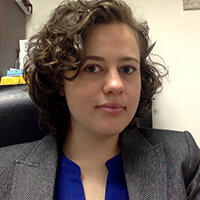 Kirsten Tarves is currently an M.A. student of Slavic Studies at the University of Manitoba. She holds a B.A. in Russian with a minor in Ukrainian from the same university. Her current research focuses on the development of Sigizmund Krzhizhanovsky’s philosophical trickster-figure in his prose between 1925 and 1928. Although Russian literature and culture are her dominant research focuses, she maintains a strong interest in Ukraine as well, and has taken courses (in English) at Kyiv-Mohyla Academy in Kyiv.
Kirsten Tarves is currently an M.A. student of Slavic Studies at the University of Manitoba. She holds a B.A. in Russian with a minor in Ukrainian from the same university. Her current research focuses on the development of Sigizmund Krzhizhanovsky’s philosophical trickster-figure in his prose between 1925 and 1928. Although Russian literature and culture are her dominant research focuses, she maintains a strong interest in Ukraine as well, and has taken courses (in English) at Kyiv-Mohyla Academy in Kyiv.
At HUSI this year she is looking forward to studying under leading experts in the field and becoming better versed in Ukrainian literary and cultural trends. She anticipates that this will assist and inform her current and future research, and she is excited to meet other students and researchers with similar interests.
Alexandra Bernosky
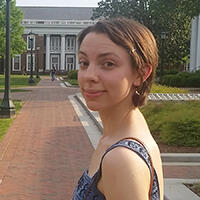 Originally from Scranton, PA, Alexandra Bernosky is in a Slavic languages & literature PhD program at the University of Virginia. She started learning Russian as a more “practical” Slavic language, she said, but Ukrainian will be a personal treat. “My family came from somewhere in Galicia but I don't know much about them, so learning some Ukrainian is the best I can do to connect with my roots. If I learn a couple of Ukrainian songs before the end of the summer I will be satisfied!”
Originally from Scranton, PA, Alexandra Bernosky is in a Slavic languages & literature PhD program at the University of Virginia. She started learning Russian as a more “practical” Slavic language, she said, but Ukrainian will be a personal treat. “My family came from somewhere in Galicia but I don't know much about them, so learning some Ukrainian is the best I can do to connect with my roots. If I learn a couple of Ukrainian songs before the end of the summer I will be satisfied!”
She’s looking forward to getting to know her classmates in the Ukrainian for Reading Knowledge course, and is even more excited about eventually putting her language skills to work in Ukraine’s archives. “I've been researching expressions and stories of national identity and nationalism,” she noted. “Currently my main interest is national identity in a post-truth context (mainly focused on Russia so far), and closer to Ukraine, the national identity of emigres of Ukrainian heritage.”
A warm welcome to all of our students in the HUSI Class of 2018! We look forward to learning more about your ideas, experiences, and accomplishments as the summer unfolds.